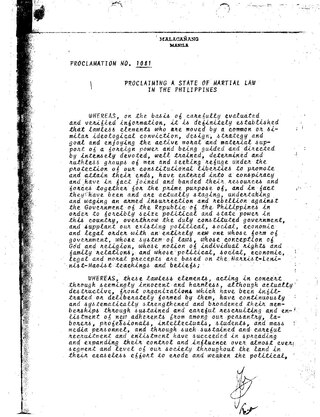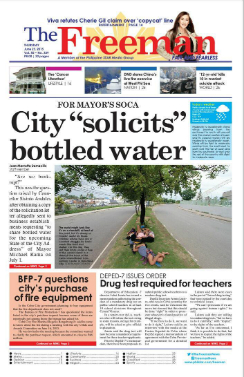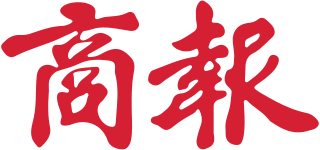Related Research Articles

Juan de la Cruz or Maria de la Cruz is the national personification of the Philippines, often used to represent the "Filipino everyman". He is usually depicted wearing the native salakot hat, barong tagalog, long pants, and tsinelas.

The Philippine Collegian is the official weekly student publication of the University of the Philippines Diliman. It is also commonly known to the university's students as Kulê. It is known for its radical, national democratic, often anti-administration views, and gives critical views on the policies of the UP administration and the Philippine government.

Proclamation No. 1081 was the document which contained formal proclamation of martial law in the Philippines by President Ferdinand Marcos, as announced to the public on September 23, 1972.

The history of the Philippines, from 1965 to 1986, covers the presidency of Ferdinand Marcos. The Marcos era includes the final years of the Third Republic (1965–1972), the Philippines under martial law (1972–1981), and the majority of the Fourth Republic (1981–1986). By the end of the Marcos dictatorial era, the country was experiencing a debt crisis, extreme poverty, and severe underemployment.

The Fourth Philippine Republic, also known as the FourthRepublic of the Philippines, was established after Ferdinand Marcos won the 1981 Philippine presidential election and referendum. Marcos announced the beginning of the Fourth Republic on June 30, during his inauguration speech. On February 25, 1986, due to the People Power Revolution, Marcos went into exile in Hawaii, and Corazon Aquino became the 11th president of the Philippines. The Fourth Republic would come to an end under Aquino's leadership, and the Fifth Republic would commence with the adoption of a new constitution.

Ambeth R. Ocampo is a Filipino public historian, academic, cultural administrator, journalist, author, and independent curator. He is best known for his definitive writings about Philippines' national hero José Rizal and on topics in Philippine history and Philippine art through Looking Back, his bi-weekly editorial page column in the Philippine Daily Inquirer.

The Philippine Star is an English-language newspaper in the Philippines and the flagship brand of the Philstar Media Group. First published on July 28, 1986, by veteran journalists Betty Go-Belmonte, Max Soliven and Art Borjal, it is one of several Philippine newspapers founded after the 1986 People Power Revolution.

People's Journal is an English-language daily tabloid newspaper published by the Philippine Journalists Incorporated. Augusto "Gus" Villanueva, its former editor-in-chief, and Antonio Friginal were founders of the company.

Martial law in the Philippines refers to the various historical instances in which the Philippine head of state placed all or part of the country under military control—most prominently during the administration of Ferdinand Marcos, but also during the Philippines' colonial period, during the second world war, and more recently on the island of Mindanao during the administrations of Gloria Macapagal Arroyo and Rodrigo Duterte. The alternative term "martial law era" as applied to the Philippines is typically used to describe the Marcos martial law period specifically.

The Freeman is a daily English-language newspaper published in Cebu, Philippines. It is the longest-running newspaper in Cebu, first published on May 10, 1919. Since 2004, the newspaper has been published by the Philstar Media Group, publisher of the Manila-based newspaper, The Philippine STAR, with former owner Jose "Dodong" Gullas retaining editorial control over the newspaper. The motto of the newspaper is "Fair and fearless".
1981 in the Philippines details events of note that happened in the Philippines in the year 1981.

The Chinese Commercial News, colloquially called the Commercial News or Siong Po, is a daily broadsheet newspaper in the Philippines written in the Chinese language. Although it is not the Philippines' first Chinese-language newspaper, it is the Philippines' oldest existing Chinese-language newspaper, and the country's third-oldest existing newspaper overall.
Teodoro Montelibano Locsin was a journalist, publisher of The Philippines Free Press Magazine and father of former Secretary of Foreign Affairs Teodoro Locsin Jr.
The Fookien Times was a daily broadsheet newspaper in the Philippines written in the Chinese language. Founded by Dee C. Chuan in 1926, it was once the Philippines' largest Chinese-language newspaper in terms of circulation.

Lourdes "Chit" Panganiban Estella-Simbulan was a Filipino journalist and professor, known for her critical writings on government repression, abuse, corruption and human rights violations.
This timeline of the presidency of Ferdinand Marcos in the Philippines covers three periods of Philippine history in which Marcos wielded political control. First, it covers the period of Marcos' first two terms—1965 to 1969 and 1969 to 1972—under the 1935 Constitution, as well as the antecedent events which brought Marcos to political power. Second, it covers the period in which Proclamation 1081, which put the entirety of the Philippines under Martial Law, was in force—from September 1972 to January 1981. Lastly, it covers the entirety of the period described as the "Fourth Republic," where the Philippines was governed by the 1973 Marcos Constitution after the formal lifting of Proclamation No. 1081.

At 7:15 p.m. on September 23, 1972, President Ferdinand Marcos announced on television that he had placed the Philippines under martial law, stating he had done so in response to the "communist threat" posed by the newly founded Communist Party of the Philippines (CPP), and the sectarian "rebellion" of the Muslim Independence Movement (MIM). Opposition figures of the time accused Marcos of exaggerating these threats and using them as an excuse to consolidate power and extend his tenure beyond the two presidential terms allowed by the 1935 constitution. Marcos signed Proclamation No. 1081 on September 21, 1972, marking the beginning of a fourteen-year period of one-man rule, which effectively lasted until Marcos was exiled from the country on February 25, 1986. Proclamation No. 1081 was formally lifted on January 17, 1981, although Marcos retained essentially all of his powers as dictator until he was ousted in February 1986.

ML is a 2018 Philippine independent psychological horror film written, co-produced, and directed by Benedict Mique Jr., starring Eddie Garcia as a retired METROCOM Colonel suffering from Alzheimer's disease, leading him to believe that he is still living in the days of Ferdinand Marcos' dictatorship. He mistakes a visiting student, played by Tony Labrusca, as a dissident resisting Martial Law, and captures and tortures him, just as he did back in the 1970s. The film was released on August 3, 2018, at the 14th Cinemalaya Independent Film Festival.
Ferdinand Marcos developed a cult of personality as a way of remaining President of the Philippines for 20 years, in a way that political scientists have compared to other authoritarian and totalitarian leaders such as Joseph Stalin and Adolf Hitler, but also to more contemporary dictators such as Suharto in Indonesia, Saddam Hussein in Iraq, and the Kim dynasty of North Korea.
Journalism during the Marcos dictatorship in the Philippines—a fourteen year period between the declaration of Martial Law in September 1972 until the People Power Revolution in February 1986—was heavily restricted under the dictatorial rule of President Ferdinand Marcos in order to suppress political opposition and prevent criticism of his administration.
References
- ↑ "A Cartoon History of the Republic: A look back at the classic editorial cartoons of Philippines Free Press illustrator Esmeraldo Z. Izon". Spot.Ph. Retrieved December 3, 2018.
- ↑ "Breaking the News: Silencing the Media Under Martial Law". Martial Law Museum. Retrieved December 3, 2018.
- ↑ Taylor, Carson; Santos, Epifanio De los (1927). History of the Philippine press. Philippine Islands.
{{cite book}}: CS1 maint: location missing publisher (link) - ↑ Escobar, Miguel (September 25, 2017). "Look Back At The Philippine Free Press' Marcos-Era Editorial Cartoons". Esquire Philippines.
- ↑ "A History of the Philippine Political Protest". Official Gazette of the Republic of the Philippines. Retrieved December 3, 2018.